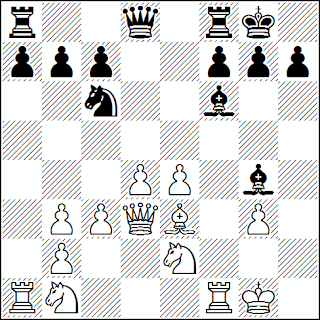Malekommentaatori pseudonüüm
Selle vahva partii kommentaare saab vaadata Chessbase'ist:
http://view.chessbase.com/cbreader/…/4/19/Game175069626.html
Malekommentaatori nimi sealt veel ei selgu. Küll aga märkame kommentaarides autori käekirja:
"musta kuningaseisust pole enam haisugi alles"
Asja edasi uurides satume huvitavale artiklile
"Pole geeniust ilma hulluseta"
mis on vist kirjutatud aastal 2018 ja võib-olla kusagil avaldatud, võib-olla on kusagile jagatud selle artikli linki, artikkel ise aga pesitseb Eesti Maleliidu veebilehel.
Artikkel räägib Paul Keresest, Jaan Ehlvestist ja Lembit Ollist, peamiselt Ollist, artiklis on linke Olli tugevamatele partiidele, mõned neist on kommenteeritud.
Ent artiklis pole märgitud selle avaldamisaega ega artikli autorit. Link ise viitab nimele
Joosep Grents
Ent jääb selgusetuks, kas Joosep on selle artikli autor (mida ta võiks olla, sest ta on maletaja) või on tema ainult artikli veebilehele üles laadinud.
Eesti Maleliidu veebilehelt otse nii kaugele edasi ei pääse hästi. Seal lõppeb vaade pealkirja all "Varia", kus on kadunud auväärt Lembit Vahesaare nimi ühes lingiga malekoodeksile. Sealt otse edasi pääsevad ehk ainult häkkerid.
Annan siin igaks juhuks veel teise lingi samale artiklile - mine sa tea, ehk on Maleliidu kodulehekülg probleemides:
Internetiarhiivis saab veenduda, et selline artikkel on üleval olnud:
Lõpuks tulin aga mõttele vaadata selle artikli PDF faili metadata't.
Selgub, et see artikkel on kirjutatud programmiga LibreOffice (selle vanema versiooniga OpenOffice, aga hea valik!) ja konverteeritud seejärel PDF failiks. Tõenäoliselt on OpenOffice'is, mida kasutati, pandud automaatrežiim, nii et failid varustatakse autori nimega (see võib olla tegelikult ainult arvuti valdaja nimi või pseudonüüm). See nimi on kandunud üle metadata sisse PDF failis ja seda pole sealt kustutatud.
Kriminoloogiline uurimus (forensic investigation) selgitab, et tõenäoliselt on partii Oll - Gipslis kommenteerija ühtlasi ka selle artikli autor, sest mõlemal on oletatav seos kõhugaasidega.
Nimelt on artikli autoriks märgitud:
Peeru Pomm
Lõpuks selgub, et see artikkel on ilmunud Maleliidu rubriigis "Uudised" 23. aprillil 2018:
http://www.maleliit.ee/…/4361-joosep-grents-pole-geeniust-i…
Seal on artikli autoriks märgitud:
Joosep Grents
Kas just maletamine põhjustab vaimuhaigusi?
Joosep Grentsi artikli
"Pole geeniust ilma hulluseta"
mis on pühendatud maletajale Lembit Oll, pealkirjast ja sisust võib leida fraase, mis viitavad stereotüüpsetele müütidele, mis on levinud mingites inimgruppides. Näiteks, et just maletajad kalduvad hulluks minema või siis, et kõik geeniused on hullud. Loomulikult kõik geeniused ei ole hullud ja vaimuhaigusi esineb igasugustel erialadel, sealhulgas erialadel, mis on seotud intensiivse vaimse tööga või tippsportlastele omase fanaatilise pühendumisega eesmärgile.
Siiski on artiklis ka märgitud, et asjale aitab kaasa fanatism, samuti maadlemine malelaual peituvate ohtlike võimaluste praktilise lõpmatusega.
Alljärgnevad kommentaarid kirjutan mälu järgi ja neid kontrollimata, neis võib esineda vigu.
***
Mõnes inimeste grupis on levinud müüt, et kõik maletajad on hullud, teises, et kõik filosoofid on hullud, jne. Mõnikord on müüdi olemasolu ise vaimuhaiguste tekke põhjuseks - ühte inimest, kes teistest erineb, näiteks oma silmapaistvate võimete tõttu, hakatakse veidrikuks pidama, mis põhjustab talle rasket psüühilist koormust.
Ega seda tõestatud ei ole, et Olli skisofreenia oli põhjustatud malemängust.
Väga intensiivne mõttetegevus ja keskendumine on vaimuhaigust süvendavad.
See intensiivsus võib olla ka arvutimängijail või kirjanikel, teadlastel, programmeerijail.
Tippspordis on vajalik fanatism, skisofreenikud on kergemini fanaatikud.
Malemäng on inimmõistuse jaoks praktiliselt lõpmatusega maadlemine.
Hulgateooria rajaja Cantor läks hulluks.
Mänguteooria geenius John Nash läks hulluks. Ta tegeles mänguteooria eriti paradoksaalsete ja absurdsete küsimustega, mis peituvad meie igapäevaelus, ilma et me seda tavaliselt teadvustaksime.
Hulluks läks isegi üks USA naisastronaut, keda treeniti lennuks Marsile, treeningu käigus hoiti astronaute kuid väikeses kinnises ruumis.
Hulluks läks üks invaspordi olümpiavõitja, kes laskis WC potil istudes läbi ukse maha oma armukese, kes oli tippmodell.
Kui Prantsusmaal hakati avalikult põletama filosoof Rousseau raamatuid ja ta tagaotsitavaks kuulutati, põgenes ta Inglismaale, Londonisse.
Ta ööbis filosoof Hume'i juures.
Ta hakkas kahtlustama, et Hume teeb Prantsuse salapolitseiga koostööd ja tahab teda ära mürgitada.
Hume oli sunnitud Rousseau välja viskama, kasutades füüsilist jõudu.
Rousseau jäi elu lõpuni raskelt vaimuhaigeks.
Rousseau ja Hume - oma sajandi kaks kuulsaimat filosoofi.
Hume viibis noorena vahepeal psühhiaatriahaiglas vaimse ületöötamise tõttu. Ta oli läbi lugenud kõik filosoofia ja kirjanduse klassikud, mis ta kodusest raamatukogust leidis ning tema aju ei pidanud vastu.
Pärast oli ta ettevaatlikum ja mõõdukam.
Malegeenius Bobby Fischeri hullumeelsusest osa on müüt, osalt on aga ühekülgne arvata, et põhjuseks oli malemäng.
Üheks mõjuvaks põhjuseks võis olla FBI jälitus- ja mõjutustegevus ajal, kui ta oli maailmameistri kandidaat ja konkureeris Nõukogude Liidu maleparemiku vastu. See oli külma sõja aegne ideoloogiline ajupesu ja poliitiline paranoia, millega teda ahistati. Pärast maailmameistriks saamist põgenes ta terve eluaja CIA agentide eest.
Kui Fischer Jaapanis türmist vabanes, siis teatas ta kohe ajakirjanikele, et USA president George Bush on kurjategija ja tuleks üles puua. Paljud tema sellised ütlemised pannakse tema hullumeelsuse arvele, ent see võib olla lihtsalt luureagentuuride taktika, et summutada dissidendi poliitilise arvamuse mõju. Kümned tuhanded USA sõjaveteranid räägivad praegu, et Iraagi sõja alustamine George Bushi poolt oli sõjakuritegu ja et selle sõja tagajärjel on hukkunud üle 10 miljoni inimese.













